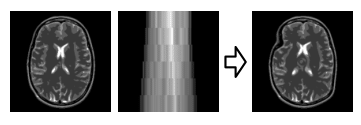Image reconstruction based on template deformations
2022
Master Semester Project
Project: 00435

Recently, template-based image reconstruction algorithms have yielded promising results for inverse problems. However, current implementations still rely on Matlab, and porting these models to PyTorch is a necessary step to combine these models with machine learning. If this is done, we can start to experiment with an additional source term, which is regularised by a learned denoiser. Here, we can extend previously obtained theoretical results and try to further increase the obtained reconstruction quality in experiments. This project requires good PyTorch knowledge and solid math background, in particular concerning the numerical solution of differential equations.
- Supervisors
- Sebastian Neumayer, sebastian.neumayer@epfl.ch, BM 4.138